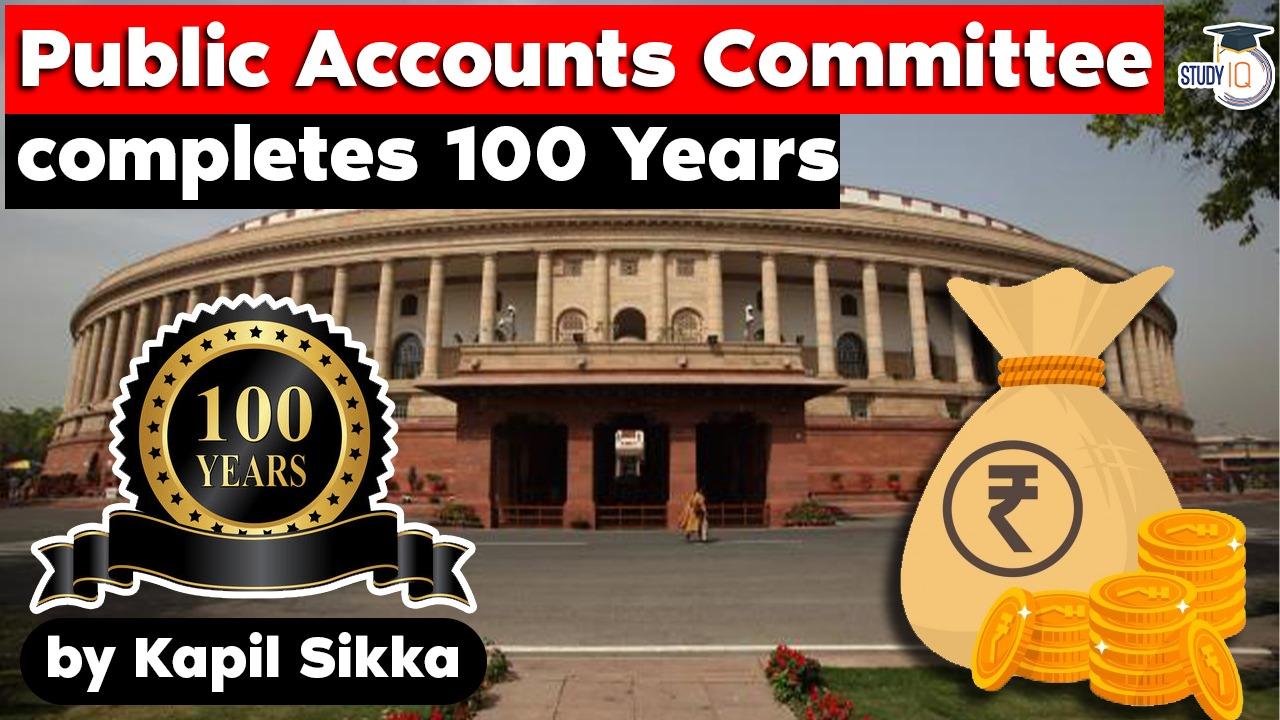Table of Contents
Public Accounts Committee completes 100 Years.

- PAC, the oldest parliamentary committee in India, is responsible for ensuring executive accountability.
- Currently, Congress leader in the Lok Sabha, Adhir Ranjan Chowdhury, heads the PAC.
COMMITTEE ON PUBLIC ACCOUNTS (Organization, functions and duties )
- The Committee on Public Accounts is constituted by Parliament each year for examination of accounts showing the appropriation of sums granted by Parliament for expenditure of Government of India, the annual Finance Accounts of Government of India, and such other accounts laid before Parliament as the Committee may deem fit such as accounts of autonomous and semi-autonomous bodies (except those of Public Undertakings and Government Companies which come under the purview of the Committee on Public Undertakings).
- The Committee on Public Accounts is the oldest Parliamentary Committee and was first constituted in 1921.
- The Committee consists of 22 Members, 15 Members are elected by Lok Sabha and 7 Members of the Rajya Sabha are associated with it.
- The Speaker is empowered to appoint the Chairman of the Committee from amongst its Members.
Function of committee
- The Committee on Public Accounts scrutinizes the Appropriation Accounts of the Government of India and the reports of the Comptroller and Auditor General of India thereon.
- While doing so, it is the duty of the Committee to satisfy itself:-
- (a) that the moneys shown in the accounts as having been disbursed were legally available for, and applicable to, the service or purpose to which have been applied or charged;
- that the expenditure conforms to the authority which governs it; and
- that every re-appropriation has been made in accordance with the provisions made in this behalf under rules framed by competent authority.
It is also the duty of the PAC :-
- (a) to examine the statement of accounts showing the income and expenditure of State Corporations, trading and manufacturing schemes, concerns and projects together with the balance sheets and statements of profit and loss accounts
- (b) to examine the statement of accounts showing the income and expenditure of autonomous and semi-autonomous bodies, the audit of which may be conducted by the C&AG of India either under the directions of the President or by a statute of Parliament; and
- (c) to consider the report of the C&AG in cases where the President may have required him to conduct an audit of any receipts and to examine the accounts of stores and stocks.
- If any money has been spent on any service during a financial year in excess of the amount granted by the House for that purpose, the Committee examine with reference to the facts of each case the circumstances leading to such an excess and make such recommendations as it may deem fit.
- An important function of the Committee is to ascertain that money granted by Parliament has been spent by Government within the scope of the demand.
- The implications of this phrase are that (i) money recorded as spent against the grant must not be more than the amount granted; (ii) the expenditure brought to account against a particular grant must be of such a nature as to warrant its record against the grant and against no others; and (iii) the grants should be spent on purposes which are set out in the detailed demand and they cannot be spent on any new service not contemplated in the demand.
- The Committee thus examines cases involving losses, nugatory expenditure and financial irregularities.
- When any case of proved negligence resulting in loss or extravagance is brought to the notice of the Committee, it calls upon the Ministry/Department concerned to explain what action, disciplinary or otherwise, it had taken to prevent a recurrence.
- In such a case it can also record its opinion in the form of disapproval or pass strictures against the extravagance or lack of proper control by the Ministry or Department concerned.
- Another important function of the Committee is the discussion on points of financial discipline and principle.
- The detailed examination of questions involving principles and system is a leading and recognized function of the Committee.
- The Committee is not concerned with questions of policy in the broad sense though it is within its jurisdiction to point out whether there has been extravagance or waste in carrying out that policy.
- While scrutinizing the Reports of the C&AG on Revenues Receipts, the Committee examines various aspects of Government’s tax administration.
- The Committee, thus, examines cases involving under-assessments, tax-evasion, non-levy of duties, mis-classifications etc., identifies the loopholes in the taxation laws and procedures and makes recommendations in order to check leakage of revenue.
Reforms required
- Post maortem examination
- No role in day to day examination
- Cant issue orders to ministries (Non Executive body)
- No authority to prohibit expenditures
Latest Burning Issues | Free PDF






















 WhatsApp
WhatsApp